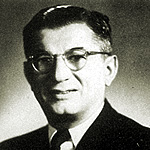Few are the songwriters to whom the overused term “legendary” applies. One of these, assuredly, is 1972 Songwriters Hall of Fame inductee Irving Caesar. For a good part of his almost 99 years, Caesar wrote great lyrics for many of America’s most enduring popular songs. And his list of collaborators represents a generous helping of the truly memorable names of show music-names like Rudolf Friml, George Gershwin, Vincent Youmans, Sigmund Romberg, Victor Herbert and Ray Henderson among them.
Interestingly, unlike many movie and show lyricists, who are hard put to give voice to their own tunes, Caesar, who characterized himself as a singing lyric writer, has been regarded as particularly facile in performing as a song demonstrator, that is, one who performs a song being sold to a music publisher.
Caesar, in his more demonstrative days, was regarded as a singer/performer in the old vaudeville tradition. Earlier on, he was praised for his singing talent by such illustrious greats as Al Jolson and Eddie Cantor, who actually helped Caesar become established in this chosen field by performing many of his songs.
Caesar was born on the fourth of July, sharing the birthdate with the late Louis “Satchmo” Armstrong and our nation itself. He attended schools in New York City and the College of the City of New York. Leaving college during his freshman year, he took part in what was known as The Ford Peace Expedition, organized by Henry Ford, whose goal was to “take the boys out of the trenches by Christmas.” Returning from Europe while the War continued, he became a regular in the Tin Pan Alley area of the city, where he met by chance another budding tunesmith, George Gershwin. The acquaintance resulted in the joint effort known as “Swanee,” one of the earliest songs of what was to become a long and notable career.
Many years ago, another working entente, this time with composer, Vincent Youmans, was born out of a sudden need for a couple of new tunes for the show, “No, No, Nanette,” for which Youmans had written the score. Two immortal pieces, “Tea for Two” and “I Want to Be Happy” (acknowledged by Caesar as the embodiment of his personal philosophy: “...but I won’t be happy until you’re happy too!”) were introduced after the show had an unremarkable debut in Detroit and were largely responsible for turning the show into a roaring success.
There were many other songs that rolled off Caesar’s pen into immortality. Just for example, there were “Sometimes I’m Happy,” “Just a Gigolo,” “Crazy Rhythm,” “If I Forget You,” “Is It True What They Say about Dixie?” and close to 2000 others.
In 1938, Caesar diverted from popular songwriting long enough to create his now famous children’s series, “Sing a Song of Safety,” a collection of children’s songs which later led to “Sing a Song of Friendship” and “Songs of Health.” The songs were utilized by schools throughout the country to teach children through the friendly environment of music, the basic principles of safety at home and in the streets. Caesar made literally hundreds of appearances in school auditoriums and lecture halls across the nation in connection with the songs.
Irving Caesar’s “Sing a Song of Friendship” is a series of 19 songs designed to promote world unity and peace and was inspired by the creation of The United Nations. The subject matter runs the gamut from racial intolerance to making the world of tomorrow safe for everyone, starting today!
Caesar also wrote a musical setting for “The Pledge of Allegiance,” which was accepted by the Federal Government and made official by Congressional resolution.


